初中英语九年级上册Unit 4 I used to be afraid of the dark Section B 2 (2a-2f)课件(共32张PPT)
文档属性
| 名称 | 初中英语九年级上册Unit 4 I used to be afraid of the dark Section B 2 (2a-2f)课件(共32张PPT) |
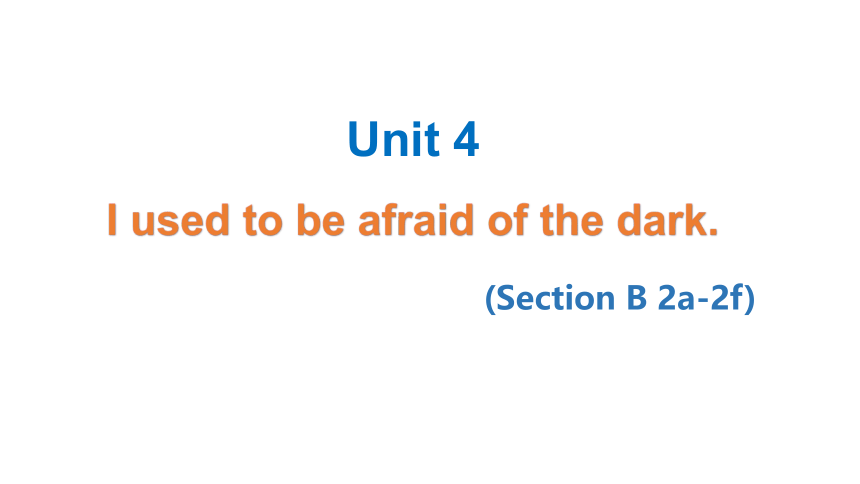
|
|
| 格式 | pptx | ||
| 文件大小 | 453.2KB | ||
| 资源类型 | 教案 | ||
| 版本资源 | 人教新目标(Go for it)版 | ||
| 科目 | 英语 | ||
| 更新时间 | 2023-09-14 23:20:30 | ||
图片预览

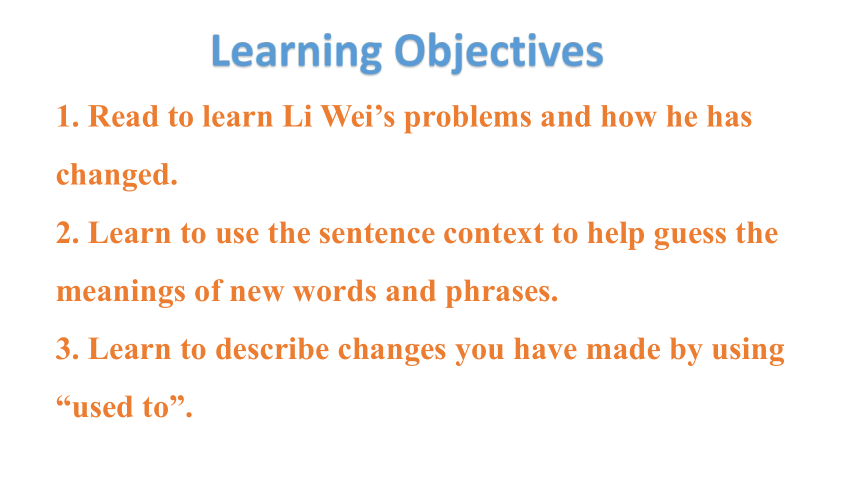
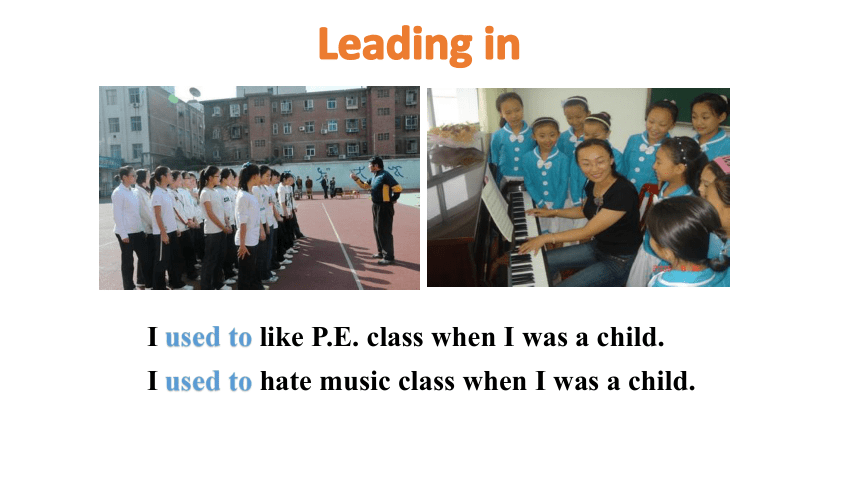
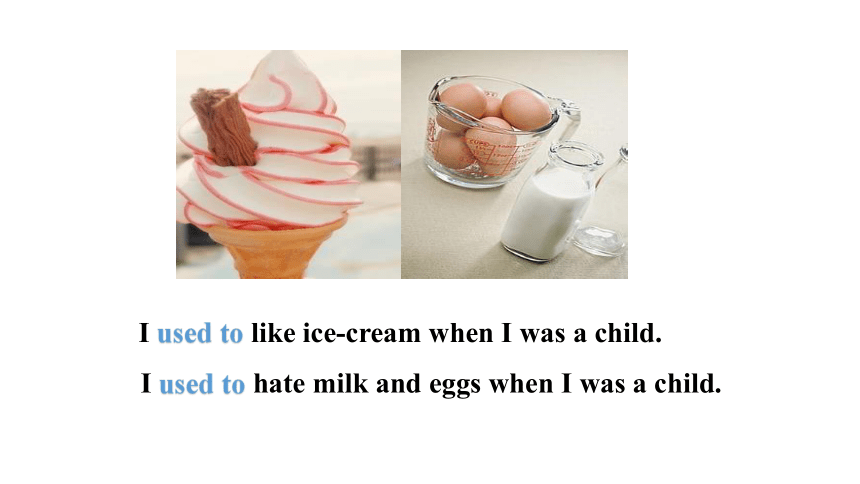
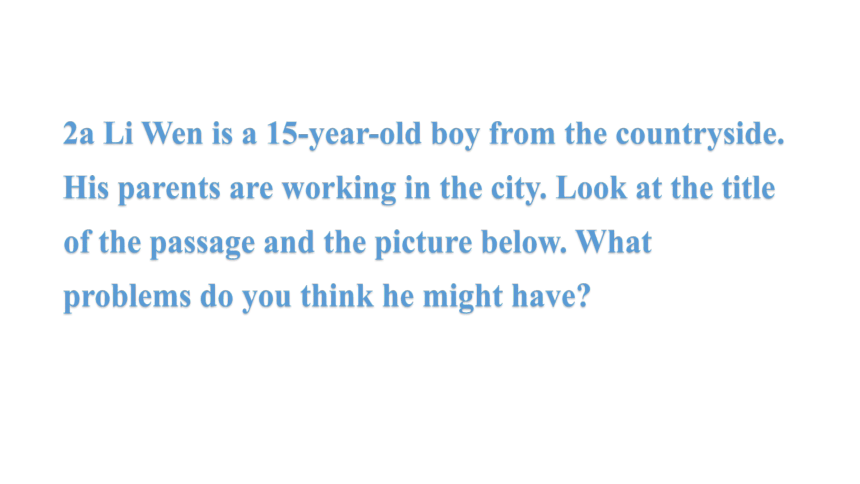
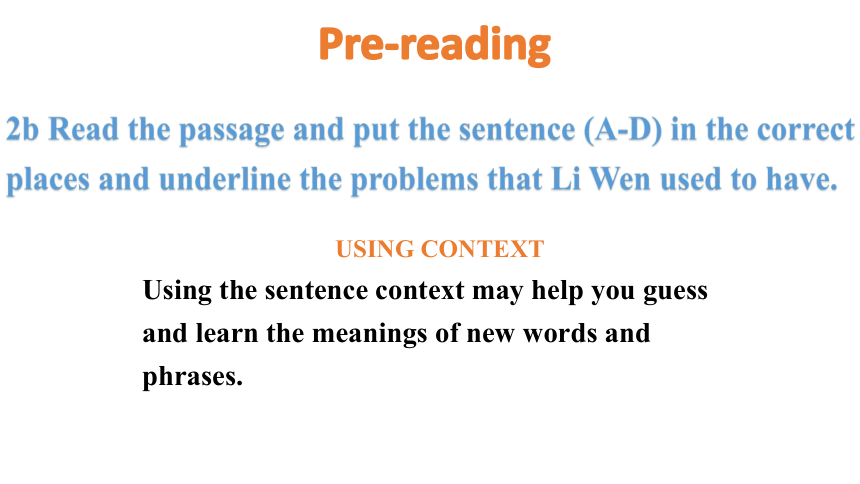
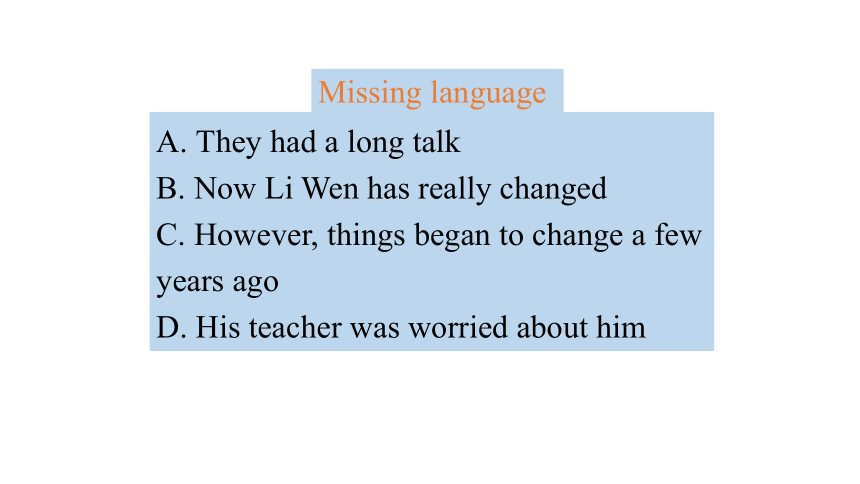
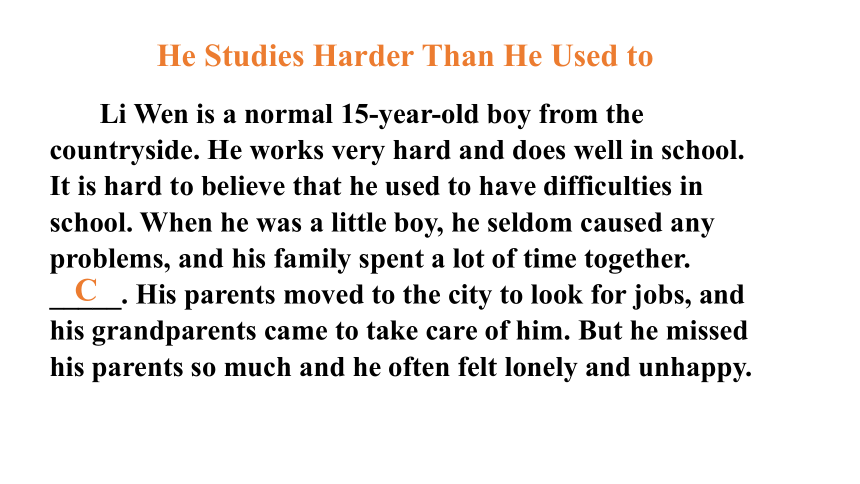

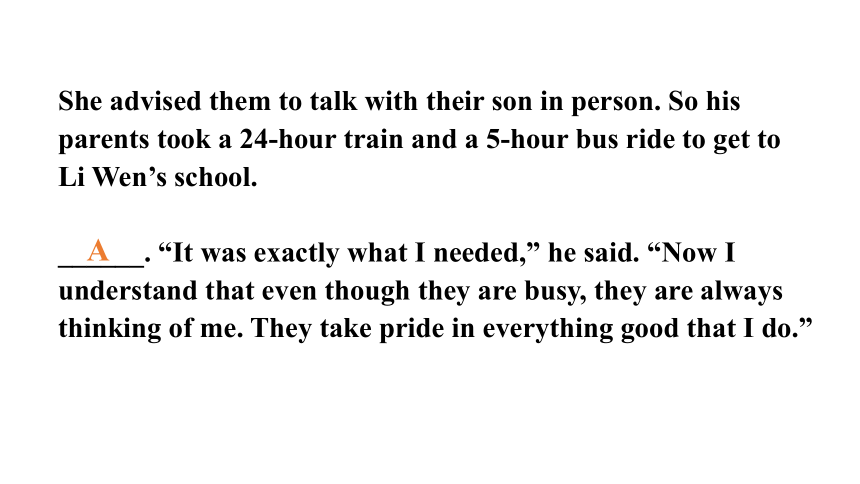

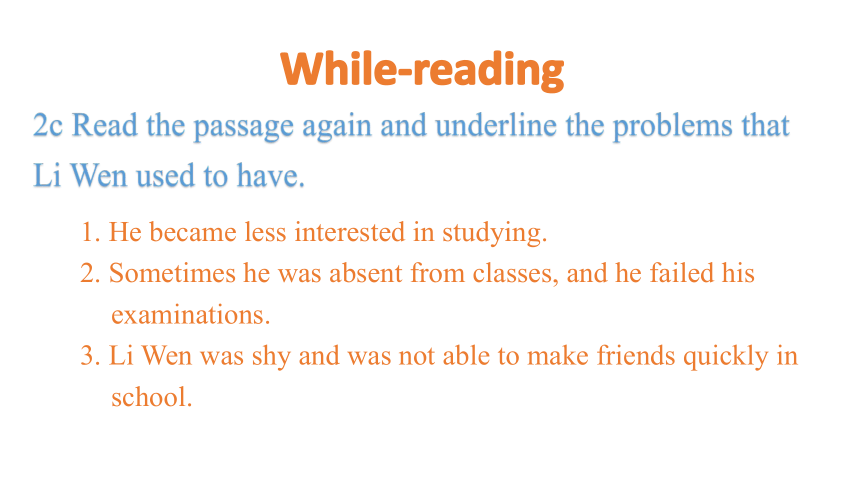
文档简介
(共32张PPT)
Unit 4
I used to be afraid of the dark.
(Section B 2a-2f)
1. Read to learn Li Wei’s problems and how he has changed.
2. Learn to use the sentence context to help guess the meanings of new words and phrases.
3. Learn to describe changes you have made by using “used to”.
Learning Objectives
Leading in
I used to like P.E. class when I was a child.
I used to hate music class when I was a child.
I used to like ice-cream when I was a child.
I used to hate milk and eggs when I was a child.
2a Li Wen is a 15-year-old boy from the countryside. His parents are working in the city. Look at the title of the passage and the picture below. What problems do you think he might have
Pre-reading
2b Read the passage and put the sentence (A-D) in the correct places and underline the problems that Li Wen used to have.
USING CONTEXT
Using the sentence context may help you guess and learn the meanings of new words and phrases.
A. They had a long talk
B. Now Li Wen has really changed
C. However, things began to change a few years ago
D. His teacher was worried about him
Missing language
He Studies Harder Than He Used to
Li Wen is a normal 15-year-old boy from the countryside. He works very hard and does well in school. It is hard to believe that he used to have difficulties in school. When he was a little boy, he seldom caused any problems, and his family spent a lot of time together. _____. His parents moved to the city to look for jobs, and his grandparents came to take care of him. But he missed his parents so much and he often felt lonely and unhappy.
C
Li Wen’s unhappiness began to influence his schoolwork. He became less interested in studying. Sometimes, he was absent from classes and failed his examinations. Finally, Li Wen’s parents made the decision to send him to a boarding school. However, Li Wen was shy and was not able to make friends quickly in school. He found life there difficult. One day he told his teacher that he wanted to leave the school. _____ and she called his parents.
D
She advised them to talk with their son in person. So his parents took a 24-hour train and a 5-hour bus ride to get to Li Wen’s school.
______. “It was exactly what I needed,” he said. “Now I understand that even though they are busy, they are always thinking of me. They take pride in everything good that I do.”
A
After that, Li Wen’s parents had much more communication with their son than they used to. ____. He has become more outgoing and made some good friends in school. He has even joined the school basketball team and became active in many other activities. “I’m much happier now, and I work even harder than I used to. I know my parents love me and they are always proud of me,” says Li Wen. “It’s very important for parents to be there for their children.”
B
2c Read the passage again and underline the problems that Li Wen used to have.
1. He became less interested in studying.
2. Sometimes he was absent from classes, and he failed his examinations.
3. Li Wen was shy and was not able to make friends quickly in school.
While-reading
2d Use clues from the passage to help you guess the meanings of the words in the box.
influence absent boarding school in person
influence
对比李文的父母外出找工作前后李文的行为和思想表现;再由下文“他变得对学习不感兴趣、逃课、考试不及格”等情况的出现,可知是李文不高兴的情绪“影响”了他的学业。故influence一词应意为“影响”。
absent
由上下文“他对学习不再感兴趣”、 “他考试不及格”,以及关键词classes,可以推测“他经常缺课”,可知absent意为“缺席,不再”。
boarding school
由上文“… he was absent from classes and failed his examinations”和“Li Wen’s parents made the decision”可知其父母送他去了一所寄宿制学校。
in person
由下文“His parents took a 24-hour train and a 5-hour bus ride to get to Li Wen’s school.”可知其父母费如此大的周折赶回家来,就是因老师的建议“亲自和他们的儿子进行交谈”,故可推测in person意为“亲自地”。
2e Complete the passage with the proper forms of the words and phrases in the box.
be proud of / take pride in
make a decision / decide
miss / be absent from
change / influence
look after / take care of
Li Wen is a 15-year-old boy. He works hard and does well in school. It is hard to believe that he used to have difficulties in school. When his parents moved to the city to work, they could not be at home to ______________________ him. So he became less interested in studying and _____________________ classes. Then his parents ______________________ to send him to a boarding school.
look after / take care of
missed/was absent from
made a decision/decided
He found life there difficult. One day he told his teacher he wanted to leave the school. His teacher advised his parents to talk with their son in person. This conversation ___________________ his life. He realized that his parents would always love him, and they would _______________________ everything good that he did. Now he is much happier and more outgoing than he used to be.
changed / influenced
be proud of / take pride in
2f What do you think Li Wen and his parents talked about in their conversation Write a conversation and role-play it with your group. Think of the following things:
Possible questions Li Wen might ask his parents
Questions his parents might ask Li Wen
Possible answers from Li Wen and his parents
Post-reading
Language points
1. It is hard to believe that he used to have difficulties in school.
It is hard to believe that …是一个含有宾语从句的复合句。主句中it作形式主语,真正的主语是that引导的从句。
It is hard to believe that they finished so much work during such a short time.
在这么短的一段时间内他们完成了如此多的工作, 这令人难以相信。
2. When he was a little boy, he seldom caused any problems, and his family spent a lot of time together.
seldom 作副词,意为“不常;很少”,相当于hardly ever, 其反义词为often(经常),通常置于实义动词之前,助动词、系动词或情态动词之后。
She seldom goes out by herself.
她很少独自外出。
He is seldom late for school.
他上学很少迟到。
3. He was absent from classes and failed his examinations.
他翘课,并且考试不及格。
(1) be absent from …意为“缺席……”,absent此处用作形容词,意为“缺席的;不在的”。
A good student would not be absent from school.
好学生是不会逃课的。
absent 用作动词, 意为 “缺席;不参加”。
He absent himself from the meeting yesterday.
他昨天没有出席会议。
4. Finally, Li Wen’s parents made the decision to send him to a boarding school.
Finally 用作副词,意为 “最后; 终于”,其同义词组是 in the end, at last。在句中作状语通常位于句首、句末或实义动词之前,be动词、助动词或情态动词之后。
Finally they got to the village.
最后他们到达了那个村庄。
(2) send … to … 意为“把……送到……”
His parents sent him to Shanghai to study.
他的父母送他到上海学习。
send 的固定搭配
send up “发射;发出”
Man-made satellites (卫星) have been sent up into space by
many countries.
send away “解雇;开除”
The boss sent away Tom.
5. She advised them to talk with their son in person.
班主任建议李文的父母亲自和他们的儿子谈谈。
advise sb. against doing sth. “劝告某人不要做某事”
He advised her against going out at night.
他劝告她晚上不要出去。
advise sb. of sth.意为“通知或告知某人有某情况”。
Please advise us of the arrival of the goods.
货物到达时请通知我们。
advise sb. to do sth.
“建议某人做某事”
advise sb. not to do sth.
“建议某人不要做某事”
The doctor advised me to take a rest.
医生建议我休息一下。
注意:advise后不能直接跟不定式作宾语。
advise doing sth. “建议做某事”
He advised leaving early.
6. “…, they are always thinking of me. They take pride in everything good that I do.”
他们一直牵挂我,并为我所做的每一件好事感到自豪。
(1) be always doing sth.意为“总是做某事,一直做某事”,always常用在一般现在时态里,表示经常的行为习惯。当与进行时连用,构成句型“be always doing sth.”时,常表达说话人的某种情绪,如赞扬、不满、责备等。
He is always asking his parents for money.
他总是向他的父母要钱。
She is always thinking of her work.
她总是想着自己的工作。
(2) take pride in “为……感到自豪/骄傲”,与be proud of 同义。后接让人引以为荣的对象。
The young mother took pride in her son.
= The young mother was proud of her son.
这个年轻的妈妈为她的儿子感到自豪。
Homework
试着比较你和你朋友现在和过去的变化:
I my friend used to now used to now
read cartoon novel
play football basketball
eat apple burger
Thank you!
Unit 4
I used to be afraid of the dark.
(Section B 2a-2f)
1. Read to learn Li Wei’s problems and how he has changed.
2. Learn to use the sentence context to help guess the meanings of new words and phrases.
3. Learn to describe changes you have made by using “used to”.
Learning Objectives
Leading in
I used to like P.E. class when I was a child.
I used to hate music class when I was a child.
I used to like ice-cream when I was a child.
I used to hate milk and eggs when I was a child.
2a Li Wen is a 15-year-old boy from the countryside. His parents are working in the city. Look at the title of the passage and the picture below. What problems do you think he might have
Pre-reading
2b Read the passage and put the sentence (A-D) in the correct places and underline the problems that Li Wen used to have.
USING CONTEXT
Using the sentence context may help you guess and learn the meanings of new words and phrases.
A. They had a long talk
B. Now Li Wen has really changed
C. However, things began to change a few years ago
D. His teacher was worried about him
Missing language
He Studies Harder Than He Used to
Li Wen is a normal 15-year-old boy from the countryside. He works very hard and does well in school. It is hard to believe that he used to have difficulties in school. When he was a little boy, he seldom caused any problems, and his family spent a lot of time together. _____. His parents moved to the city to look for jobs, and his grandparents came to take care of him. But he missed his parents so much and he often felt lonely and unhappy.
C
Li Wen’s unhappiness began to influence his schoolwork. He became less interested in studying. Sometimes, he was absent from classes and failed his examinations. Finally, Li Wen’s parents made the decision to send him to a boarding school. However, Li Wen was shy and was not able to make friends quickly in school. He found life there difficult. One day he told his teacher that he wanted to leave the school. _____ and she called his parents.
D
She advised them to talk with their son in person. So his parents took a 24-hour train and a 5-hour bus ride to get to Li Wen’s school.
______. “It was exactly what I needed,” he said. “Now I understand that even though they are busy, they are always thinking of me. They take pride in everything good that I do.”
A
After that, Li Wen’s parents had much more communication with their son than they used to. ____. He has become more outgoing and made some good friends in school. He has even joined the school basketball team and became active in many other activities. “I’m much happier now, and I work even harder than I used to. I know my parents love me and they are always proud of me,” says Li Wen. “It’s very important for parents to be there for their children.”
B
2c Read the passage again and underline the problems that Li Wen used to have.
1. He became less interested in studying.
2. Sometimes he was absent from classes, and he failed his examinations.
3. Li Wen was shy and was not able to make friends quickly in school.
While-reading
2d Use clues from the passage to help you guess the meanings of the words in the box.
influence absent boarding school in person
influence
对比李文的父母外出找工作前后李文的行为和思想表现;再由下文“他变得对学习不感兴趣、逃课、考试不及格”等情况的出现,可知是李文不高兴的情绪“影响”了他的学业。故influence一词应意为“影响”。
absent
由上下文“他对学习不再感兴趣”、 “他考试不及格”,以及关键词classes,可以推测“他经常缺课”,可知absent意为“缺席,不再”。
boarding school
由上文“… he was absent from classes and failed his examinations”和“Li Wen’s parents made the decision”可知其父母送他去了一所寄宿制学校。
in person
由下文“His parents took a 24-hour train and a 5-hour bus ride to get to Li Wen’s school.”可知其父母费如此大的周折赶回家来,就是因老师的建议“亲自和他们的儿子进行交谈”,故可推测in person意为“亲自地”。
2e Complete the passage with the proper forms of the words and phrases in the box.
be proud of / take pride in
make a decision / decide
miss / be absent from
change / influence
look after / take care of
Li Wen is a 15-year-old boy. He works hard and does well in school. It is hard to believe that he used to have difficulties in school. When his parents moved to the city to work, they could not be at home to ______________________ him. So he became less interested in studying and _____________________ classes. Then his parents ______________________ to send him to a boarding school.
look after / take care of
missed/was absent from
made a decision/decided
He found life there difficult. One day he told his teacher he wanted to leave the school. His teacher advised his parents to talk with their son in person. This conversation ___________________ his life. He realized that his parents would always love him, and they would _______________________ everything good that he did. Now he is much happier and more outgoing than he used to be.
changed / influenced
be proud of / take pride in
2f What do you think Li Wen and his parents talked about in their conversation Write a conversation and role-play it with your group. Think of the following things:
Possible questions Li Wen might ask his parents
Questions his parents might ask Li Wen
Possible answers from Li Wen and his parents
Post-reading
Language points
1. It is hard to believe that he used to have difficulties in school.
It is hard to believe that …是一个含有宾语从句的复合句。主句中it作形式主语,真正的主语是that引导的从句。
It is hard to believe that they finished so much work during such a short time.
在这么短的一段时间内他们完成了如此多的工作, 这令人难以相信。
2. When he was a little boy, he seldom caused any problems, and his family spent a lot of time together.
seldom 作副词,意为“不常;很少”,相当于hardly ever, 其反义词为often(经常),通常置于实义动词之前,助动词、系动词或情态动词之后。
She seldom goes out by herself.
她很少独自外出。
He is seldom late for school.
他上学很少迟到。
3. He was absent from classes and failed his examinations.
他翘课,并且考试不及格。
(1) be absent from …意为“缺席……”,absent此处用作形容词,意为“缺席的;不在的”。
A good student would not be absent from school.
好学生是不会逃课的。
absent 用作动词, 意为 “缺席;不参加”。
He absent himself from the meeting yesterday.
他昨天没有出席会议。
4. Finally, Li Wen’s parents made the decision to send him to a boarding school.
Finally 用作副词,意为 “最后; 终于”,其同义词组是 in the end, at last。在句中作状语通常位于句首、句末或实义动词之前,be动词、助动词或情态动词之后。
Finally they got to the village.
最后他们到达了那个村庄。
(2) send … to … 意为“把……送到……”
His parents sent him to Shanghai to study.
他的父母送他到上海学习。
send 的固定搭配
send up “发射;发出”
Man-made satellites (卫星) have been sent up into space by
many countries.
send away “解雇;开除”
The boss sent away Tom.
5. She advised them to talk with their son in person.
班主任建议李文的父母亲自和他们的儿子谈谈。
advise sb. against doing sth. “劝告某人不要做某事”
He advised her against going out at night.
他劝告她晚上不要出去。
advise sb. of sth.意为“通知或告知某人有某情况”。
Please advise us of the arrival of the goods.
货物到达时请通知我们。
advise sb. to do sth.
“建议某人做某事”
advise sb. not to do sth.
“建议某人不要做某事”
The doctor advised me to take a rest.
医生建议我休息一下。
注意:advise后不能直接跟不定式作宾语。
advise doing sth. “建议做某事”
He advised leaving early.
6. “…, they are always thinking of me. They take pride in everything good that I do.”
他们一直牵挂我,并为我所做的每一件好事感到自豪。
(1) be always doing sth.意为“总是做某事,一直做某事”,always常用在一般现在时态里,表示经常的行为习惯。当与进行时连用,构成句型“be always doing sth.”时,常表达说话人的某种情绪,如赞扬、不满、责备等。
He is always asking his parents for money.
他总是向他的父母要钱。
She is always thinking of her work.
她总是想着自己的工作。
(2) take pride in “为……感到自豪/骄傲”,与be proud of 同义。后接让人引以为荣的对象。
The young mother took pride in her son.
= The young mother was proud of her son.
这个年轻的妈妈为她的儿子感到自豪。
Homework
试着比较你和你朋友现在和过去的变化:
I my friend used to now used to now
read cartoon novel
play football basketball
eat apple burger
Thank you!
同课章节目录
- Unit 1 How can we become good learners.
- Section A
- Section B
- Unit 2 I think that mooncakes are delicious!
- Section A
- Section B
- Unit 3 Could you please tell me where the restroom
- Section A
- Section B
- Unit 4 I used to be afraid of the dark.
- Section A
- Section B
- Unit 5 What are the shirts made of?
- Section A
- Section B
- Review of Units 1-5
- Unit 6 When was it invented?
- Section A
- Section B
- Unit 7 Teenagers should be allowed to choose their
- Section A
- Section B
- Unit 8 It must belong to Carla.
- Section A
- Section B
- Unit 9 I like music that I can dance to.
- Section A
- Section B
- Unit 10 You're supposed to shake hands.
- Section A
- Section B
- Review of Units 6-10
- Unit 11 Sad movies make me cry.
- Section A
- Section B
- Unit 12 Life is full of the unexpected
- Section A
- Section B
- Unit 13 We're trying to save the earth!
- Section A
- Section B
- Unit 14 I remember meeting all of you in Grade 7.
- Section A
- Section B
- Review of Units 11-14
